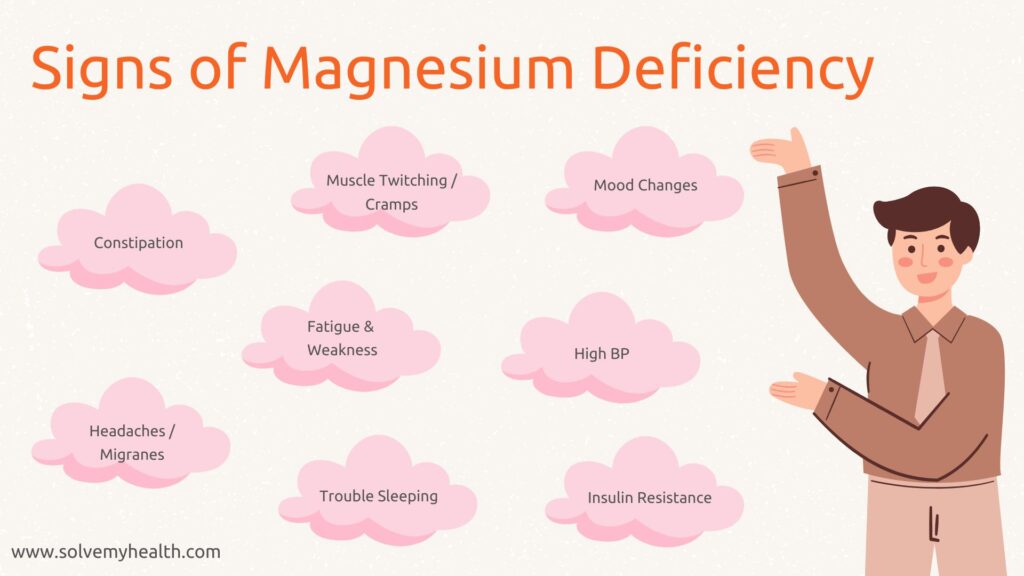Magnesium is a crucial mineral that plays a vital role in over 300 biochemical reactions in the body, including energy production, nerve function, muscle contraction, and maintaining a steady heart rhythm. Despite its importance, magnesium deficiency is very common among people. Studies suggest that up to 50% of the population may be consuming less than the recommended daily amount of magnesium. This deficiency often goes unnoticed because the symptoms of magnesium deficiency can be mistaken for other health issues, such as stress or fatigue.
One of the main reasons for magnesium deficiency is the modern dietary habits. Additionally, factors like chronic stress, excessive alcohol consumption, and certain medications can deplete magnesium levels in the body. Without enough magnesium, long-term health problems such as cardiovascular disease, osteoporosis, sleep disorders, mood disorders and metabolic syndromes can develop. Addressing this issue is essential for overall health and well-being, especially as the deficiency is often overlooked.
Also Read: Insomnia – Causes & Treatment
How do you test for Magnesium Deficiency?
There are two levels of hypomagnesemia or magnesium deficiency – mild and severe. Mild deficiency might cause symptoms like muscle cramps, fatigue, irritability, insomnia etc. But severe cases of magnesium deficiency can lead to more serious issues such as heart arrhythmias, seizures, and abnormal calcium or potassium levels.
Because magnesium is stored primarily in bones and tissues, blood tests may not always detect a deficiency, as only 1% of the body’s magnesium is found in the bloodstream. Hence serum magnesium levels may not accurately reflect total magnesium levels in the body. This can make identifying and treating magnesium deficiency more challenging without a comprehensive approach that considers symptoms and lifestyle factors.
Also Read: Circadian Rhythm Disorders
Common Symptoms of Magnesium Deficiency
Magnesium deficiency often begins with subtle symptoms that are easy to overlook. One of the earliest signs is muscle cramps or spasms which occur because magnesium helps regulate muscle and nerve function. Without enough magnesium, muscles can become tense and overreact to stimuli, leading to involuntary contractions or twitches. This is often accompanied by fatigue, as magnesium is crucial for energy production at the cellular level. Low magnesium levels can reduce the body’s ability to convert food into usable energy, leaving individuals feeling tired or weak even with adequate rest.

As magnesium deficiency progresses, it can affect the nervous system, leading to symptoms such as irritability, anxiety, and trouble concentrating. Magnesium helps regulate neurotransmitters, which are chemicals that send signals between nerve cells. When magnesium levels are too low, these signals can become imbalanced, contributing to mental health issues like increased stress, mood swings, or even depression.
Additionally, poor sleep quality or insomnia occurs, as magnesium plays an important role in the regulation of sleep by influencing the release of melatonin, the hormone responsible for sleep cycles. In more severe cases, magnesium deficiency can lead to serious health complications such as irregular heart rhythms (arrhythmias) and numbness or tingling in the extremities. This is because magnesium helps maintain proper electrical activity in the heart and supports nerve function
Key Causes of Magnesium Deficiency
Magnesium deficiency can result from a variety of factors, with diet being one of the most common causes. Modern diets often lack sufficient magnesium due to the widespread consumption of processed foods, which are typically low in this essential mineral. Magnesium-rich foods like leafy greens, nuts, seeds, and whole grains have become less common in many people’s daily meals. Additionally, modern agricultural practices have led to soil depletion, such that even fresh produce may contain lower levels of magnesium than it did in the past. As a result, many individuals fail to meet their recommended daily intake of magnesium.
Another significant contributor to magnesium deficiency is gastrointestinal disorders that impair the body’s ability to absorb magnesium properly. Conditions such as Crohn’s disease, celiac disease, acidity, IBS and chronic diarrhea can interfere with magnesium absorption in the intestines. People who have undergone surgery on their digestive tract, such as gastric bypass, are also at risk due to altered digestion and nutrient absorption. Furthermore, kidney disorders that cause excessive magnesium loss through urine can contribute to deficiency, as the kidneys play a key role in regulating magnesium levels in the body.
Chronic stress is another factor that can deplete magnesium levels. Stress causes the body to release higher levels of cortisol, a hormone that can increase magnesium excretion through the urine. Prolonged periods of stress can therefore lead to a gradual depletion of magnesium levels in our body. This continues like a vicious cycle, as low magnesium levels can, in turn, make the body even more susceptible to stress. Individuals dealing with chronic stress may experience worsening symptoms if magnesium levels are not adequately replenished.
Certain medications can also contribute to magnesium deficiency. Diuretics, commonly prescribed for high blood pressure or heart failure, increase urine output and can lead to the loss of essential minerals, including magnesium. Other medications, such as proton pump inhibitors (PPIs), used to treat acidity or heartburn (Eg – Rabeprazole, Pantoprazole, Omeprazole) also can reduce magnesium absorption when taken for long-term.
Even some antibiotics can interfere with magnesium levels. For individuals taking these medications regularly, monitoring magnesium intake is essential to avoid potential deficiencies and their associated health risks.
How to Boost Your Magnesium Levels
The most natural way to increase magnesium levels is through diet, by consuming foods rich in magnesium. Some of the best dietary sources of magnesium include leafy green vegetables like spinach, nuts and seeds such as almonds and pumpkin seeds, legumes like black beans, and whole grains such as brown rice and quinoa. Other magnesium-rich foods include avocados, bananas, and dark chocolate. By incorporating a variety of these foods into your daily meals, one could meet their body’s magnesium requirements.
However, due to modern agricultural practices, the magnesium content in foods may not be as high as it once was. Depletion of minerals in soil has led to lower magnesium levels in many crops. This means that even if you are eating magnesium-rich foods, there is a chance that you might still not be getting enough magnesium to meet your daily needs. Additionally, factors like cooking methods and food processing can further reduce magnesium content. In such cases, magnesium supplements can help fill the gap and ensure you are getting the right amount of this essential mineral.
There are several forms of magnesium supplements available, but they differ in how well the body absorbs them. For instance, magnesium oxide is commonly found in supplements, but it has a lower absorption rate compared to other forms. On the other hand, magnesium citrate and magnesium glycinate are considered more bioavailable, meaning they are better absorbed by the body. Magnesium glycinate, in particular, is a popular choice because it is gentle on the stomach and less likely to cause digestive issues like diarrhea, which can occur with other forms of magnesium.
SOLVE Magnesium Glycinate is designed to provide a high-quality, easily absorbable form of magnesium. Unlike other supplements that may contain impurities or contaminants, SOLVE ensures its magnesium is free from heavy metals and other harmful substances. By using magnesium glycinate, this supplement supports optimal absorption, making it more effective for people who need to boost their magnesium levels. In addition, SOLVE’s formulation prioritises quality and safety, ensuring that the magnesium you are taking is both effective and pure. This makes SOLVE Magnesium Glycinate a reliable choice for improving magnesium levels without unwanted side effects.
Conditions Where Magnesium Supplementation Can Help
- Migraines: Magnesium has been shown to help reduce the frequency and severity of migraines. Low magnesium levels are common in people who experience migraines, and supplementation can help relax blood vessels and improve nerve function, both of which may prevent or alleviate migraine attacks.
- Fibromyalgia: Studies have shown that individuals with fibromyalgia often have lower magnesium levels, and increasing magnesium intake can potentially improve symptoms. Magnesium plays a key role in muscle relaxation, nerve function, and reducing inflammation, all of which are relevant to fibromyalgia, a condition characterised by widespread pain, fatigue, and muscle stiffness. Additionally, magnesium supports sleep quality, which is often disrupted in fibromyalgia patients, further aiding in symptom relief.
- Premenstrual Syndrome (PMS): Magnesium can alleviate symptoms of PMS, such as mood swings, bloating, and cramps. Research suggests that magnesium helps regulate neurotransmitters and reduce prostaglandin production, which contributes to pain and discomfort during PMS.
- Hypertension (High Blood Pressure): Magnesium helps regulate blood pressure by relaxing blood vessels and supporting healthy cardiovascular function. Studies show that magnesium supplementation can lower both systolic and diastolic blood pressure, especially in individuals with magnesium deficiency or mild hypertension.
- Type 2 Diabetes: Magnesium plays a role in glucose metabolism and insulin sensitivity. People with type 2 diabetes often have low magnesium levels, and supplementation may help improve blood sugar control and insulin function, reducing the risk of complications.
- Anxiety and Depression: Magnesium has a calming effect on the nervous system and helps regulate neurotransmitters like serotonin, which can impact mood. Low magnesium levels are linked to higher rates of anxiety and depression, and supplementation may help alleviate these symptoms.
- Parkinsons, Alzeimers & Epilepsy: Magnesium plays a protective role in various neurological disorders, including Parkinson’s disease, Alzheimer’s disease and Epilepsy. In Parkinson’s, it may help by reducing oxidative stress and inflammation in the brain, potentially slowing disease progression. For Alzheimer’s, magnesium can support brain health by protecting neurons and improving memory function. Additionally, magnesium may help manage symptoms of epilepsy by stabilising electrical activity in the brain, and it can also alleviate anxiety and depression by regulating neurotransmitters involved in mood control.
- Osteoporosis: Magnesium is crucial for bone health, as it aids in calcium absorption and supports bone density. Low magnesium levels are associated with a higher risk of osteoporosis, and supplementation may help reduce bone loss and improve overall bone health.
Are you struggling with restless nights or feeling constantly fatigued despite your best efforts? Magnesium might be the missing link. This essential mineral plays a huge role in supporting restful sleep, reducing stress, and keeping your energy levels steady. But not all magnesium supplements are created equal—and choosing the wrong one can lead to unwanted side effects.
That’s why SOLVE Magnesium Glycinate is specially formulated to be gentle on your system, providing maximum absorption with minimal side effects. Before choosing a magnesium supplement, it’s important to understand the risks of using the wrong one. Here are five key risks to consider when choosing magnesium supplements:
Magnesium Glycinate
SOLVE Magnesium Glycinate is specially formulated to supporting both physical relaxation and mental well-being. Our carefully crafted blend includes: Highly Bioavailable Magnesium for optimal absorption and minimal digestive discomfort Glycine to promote calmness and support restful, rejuvenating sleep Muscle and Nerve Support to maintain healthy muscle function and a balanced nervous system Clinically Researched Ingredients known to enhance relaxation, sleep quality, blood pressure and overall stress management
5 Risks of Using the Wrong Magnesium Supplementation
- Digestive Distress High doses of certain magnesium supplements, like magnesium oxide, are not fully absorbed by the body, often leading to unpleasant digestive issues like diarrhea, bloating, and cramps. To minimize these risks, magnesium glycinate or magnesium malate are usually gentler on the stomach.
- Electrolyte Imbalance Magnesium works closely with other electrolytes, such as calcium and potassium. Using the wrong form or dose of magnesium can disrupt this balance, causing symptoms like fatigue, muscle weakness, and even irregular heartbeats. It’s important to find a supplement that suits your needs and doesn’t interfere with these other critical minerals.
- Potential for Magnesium Overload Taking more than the recommended amount of magnesium (400 mg/day for men, 300 mg/day for women) can lead to an overload. Excessive intake might cause low blood pressure, nausea, and in severe cases, respiratory issues. Those with kidney problems are especially at risk, as their bodies may struggle to clear excess magnesium.
- Interactions with Medications Some magnesium supplements can interact with medications, such as antibiotics or blood pressure drugs. These interactions may reduce the effectiveness of either the magnesium or the medication. Always check with your healthcare provider if you’re on medication and planning to add a magnesium supplement to your routine.
- Choosing Low-Quality Supplements Not all magnesium supplements are created equal. Low-quality supplements may contain fillers or impurities that can be harmful over time. Look for products that have been tested for purity and have a high bioavailability—like SOLVE Magnesium Glycinate—to ensure you’re getting an effective and safe dose.
In summary, magnesium supplements can be beneficial, but choosing the right type and dosage is crucial. If you’re considering magnesium supplementation, especially if you have a health condition, consult with a healthcare provider to find the best option for you. Discover how SOLVE Magnesium Glycinate can support relaxation and restful sleep with its premium, bioavailable formula.











